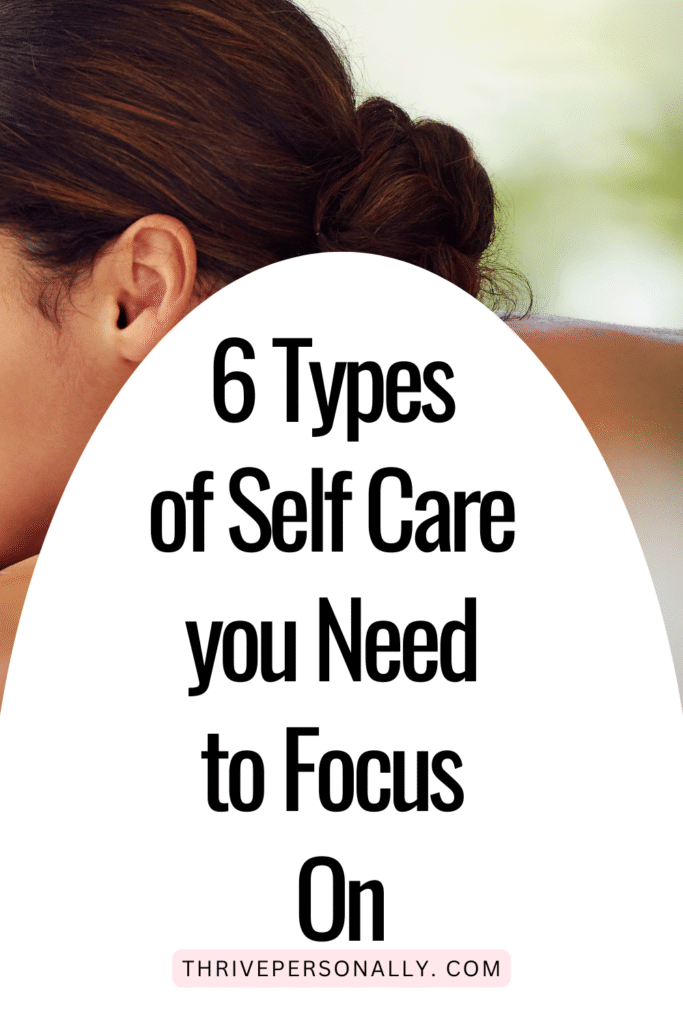At one point, I thought being good to myself meant eating healthy, exercising, and sleeping more. But over time, I learned that self-care goes beyond that.
Self-care is not only about taking a break or indulging yourself. It’s about creating balance in all areas of your life. It means listening to what your mind, body, and soul need—and acting on it without guilt.
Many people see self-care as a luxury or something you do only when you have extra time. The truth is, it’s essential if you want to live a life that feels full, peaceful, and strong.
The challenge is that we often focus on one area of self-care and neglect the rest. For example, you might exercise and eat well but ignore your emotional health. Or you work on your mental strength but forget your social connections. When that happens, life starts to feel out of balance.
6 Types of Self Care you Need to Focus On
1. Physical Self-Care

Your body is your home. To live well, you need to care for it. Physical self-care is more than exercise—it’s doing what your body needs to function at its best. This includes enough sleep, nutritious food, and movement you enjoy.
When you neglect your body, it shows. You may feel tired, lose focus, or even become stressed because your system is overloaded. On the other hand, when your body is strong, life feels easier and more manageable.
Practical steps include eating balanced meals, staying hydrated, getting quality sleep, and moving regularly. Sleep, in particular, is often ignored but plays a powerful role in your health. According to Harvard Medical School, good sleep restores your body and improves mood and mental clarity.
Physical care is the foundation for all other types of self-care. When your body feels good, everything else flows better.
Read also: 15 Good Habits for Self-Care
2. Emotional Self-Care
Just like your body, your heart needs care too. Emotional self-care is about recognizing your feelings and expressing them in healthy ways. Many people hide their emotions out of fear of being “too much” or “too weak.” But ignored emotions don’t disappear—they only grow heavier inside.
Healthy emotional care means finding safe ways to release what you feel. This might include talking to someone you trust, journaling your thoughts, or allowing yourself to cry when you need to. It also means being gentle with yourself when things don’t go as planned.
One simple way to support your emotional health is to check your self-talk. How do you speak to yourself? Are you kind or critical? The way you talk to yourself shapes how you see life. Practice speaking to yourself with the same care you’d give someone you love.
Mindfulness is another powerful tool for emotional balance. The American Psychological Association notes that mindfulness helps reduce stress and improve emotional well-being by teaching you to stay calm and present. Start small with a few minutes of deep breathing to center your thoughts and emotions.
Read also: 15 Clear Signs You Need Self-Care
3. Mental Self-Care

Your mind needs just as much attention as your body and emotions. Mental self-care is about feeding your mind with things that help it grow and stay clear.
This might involve reading, learning a new skill, or solving puzzles that challenge your brain. It also means protecting your mind from overload. Too much negative news or endless scrolling on social media can leave you anxious and drained.
Setting boundaries around your time and energy is part of mental care. When your schedule is too tight, your mind never gets the chance to rest. Give yourself moments of silence where you simply breathe and let your thoughts settle.
Research shows that activities like meditation improve focus and emotional balance. Even five minutes a day can make a big difference.
4. Social Self-Care
Humans are wired for connection. Even if you enjoy time alone, you still need some level of social support. Social self-care means building healthy relationships where you feel understood and supported.
Neglecting your social needs can lead to loneliness, which is linked to mental and physical health problems. On the other hand, positive relationships can lower stress and boost happiness. Studies from the National Institutes of Health show that strong social ties improve overall well-being and even increase longevity.
Social care isn’t about having a large circle of friends—it’s about quality, not quantity. A few deep, meaningful connections matter more than many shallow ones. Make time to connect with someone you trust, share a meal, or enjoy a good conversation. And remember, boundaries are part of social self-care. It’s okay to distance yourself from toxic or harmful relationships.
5. Spiritual Self-Care

Spiritual self-care is about connecting with something bigger than yourself. It doesn’t have to be religious—though for some, that’s part of it. It’s about finding meaning and purpose beyond the daily grind.
Spiritual practices can include prayer, meditation, spending time in nature, or reflecting on your values. These moments remind you that life is more than deadlines and bills. They help you find peace in chaos and hope during hard times.
Research suggests that spiritual practices like meditation or prayer can reduce stress and boost a sense of well-being. If you’re unsure where to start, begin with silence. Lie down, put your feet up, breathe deeply, and just allow yourself to be. Even small moments like this can bring calm and clarity.
6. Practical Self-Care
Self-care isn’t always glamorous—it also includes managing the everyday tasks that keep your life running smoothly. Practical self-care means taking care of the things that reduce stress in the long run, like paying bills on time, keeping your space clean, and staying organized.
While these tasks may not feel relaxing, they prevent unnecessary chaos. When you stay on top of these responsibilities, life feels lighter and more manageable. One simple way to start is by creating a small routine to keep things in order.
Final Thoughts
Self-care isn’t one single act—it’s a collection of small choices that keep you balanced. If you focus only on one area, you’ll feel empty in the others. That’s why understanding your physical, emotional, mental, social, spiritual, and practical needs is so important.
You don’t have to do everything at once. Start with one area and grow from there. Self-care isn’t about perfection—it’s about balance. When you care for yourself, you become stronger, calmer, and more capable of handling whatever life brings.
Save the pin for later



